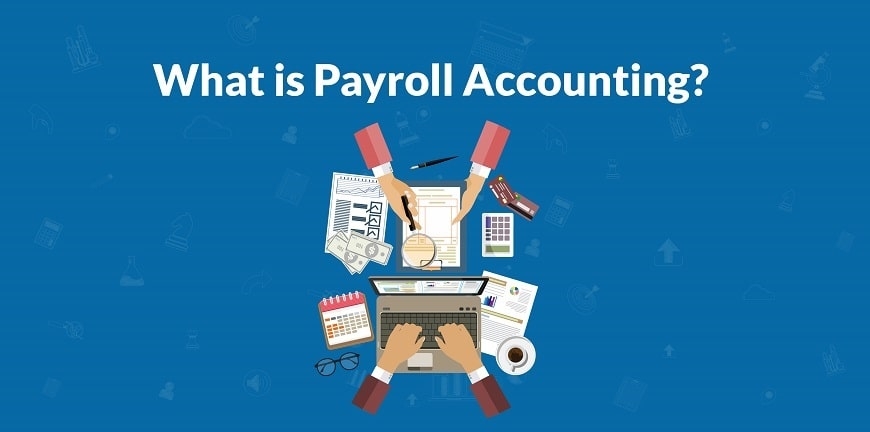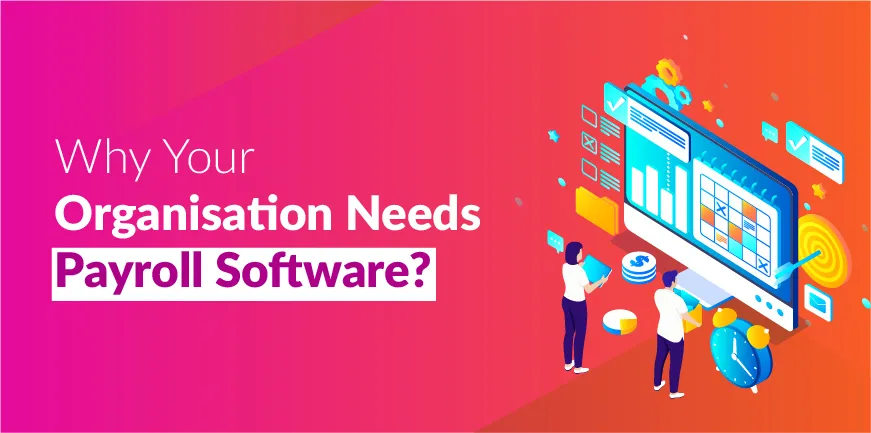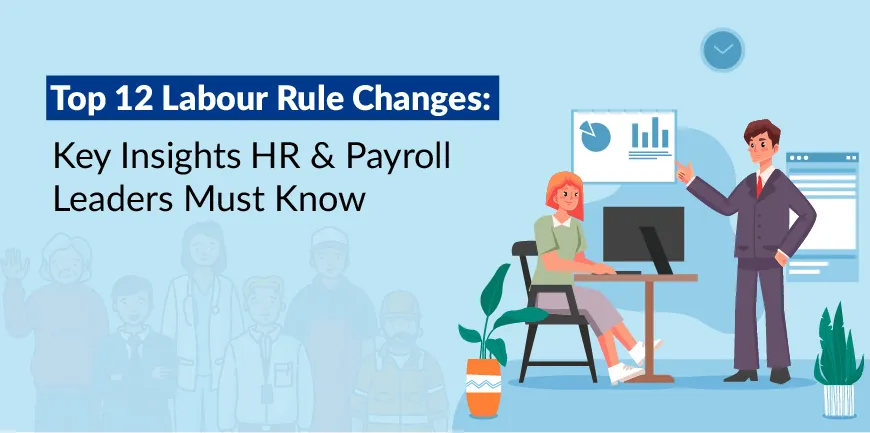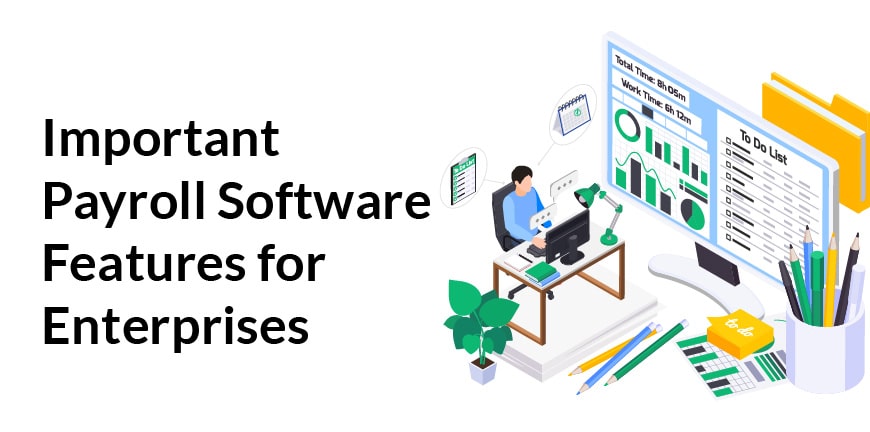
The Most Important Payroll Software Features for Enterprises
22/11/2023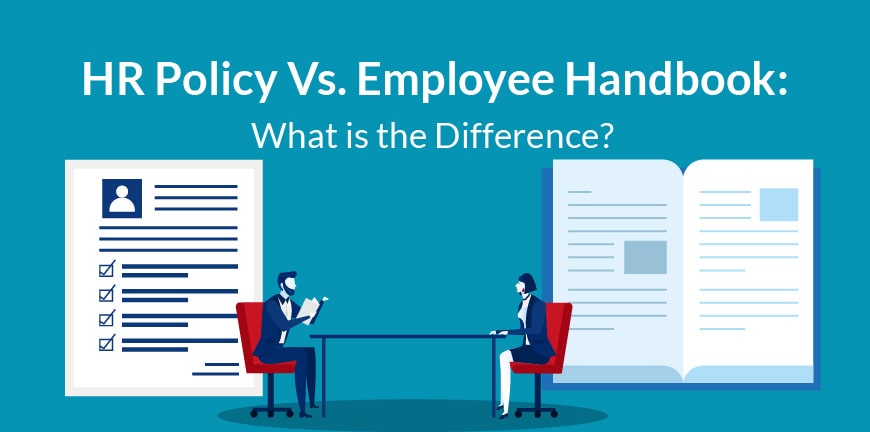
What Is the Difference Between HR Policy and Employee Handbook?
27/11/2023Payroll is an integral part of every organization, as it is something that every employee looks forward to and is also the biggest motivating factor. It’s an element that needs to be taken care of with utmost care and precision. Processing an error-free payroll is the key to keeping your employees happy and boosting the productivity of the organization.
A streamlined and well-integrated payroll accounting system is essential for any organization to ensure that all employees are paid on time and accurately. Payroll accounting involves everything from benefits to taxes and compensation.
According to reports, the Indian payroll services market was valued at about USD 1.78 billion in 2025 and is projected to reach around USD 2.56 billion by 2030, growing at a CAGR of 7.5%.
What is Payroll Accounting?
Payroll Accounting is a process of maintaining, analysing, and verifying the financial records of an organization. It encompasses payroll functions such as calculating salaries, management of benefits and compensation withholding taxes, and deductions.
What are the Types of Payroll Expenses
Various types of expenses fall under payroll accounting. They are-
- Employee compensation- Salaries, commissions, and tips.
- Payroll taxes- Taxes paid on employee wages with adherence to federal and state regulations.
- FICA taxes- Employer’s part covering Medicare and Social Security payments for employees.
- Employee benefits- Health insurance premiums and other benefits.
- Additional perks- Childcare, education support services, etc.
Payroll accounting does not include elements that are not related to employee compensation and benefits, such as rent, utilities, office supplies, or other expenses.
What are the Types of Payroll Accounting Entries
An accurate financial recording is extremely crucial to maintain an error-free payroll process. Before any kind of transaction can happen, your accountant should ensure that all the transactions are recorded.
Some of the payroll accounting entries you should consider for your business are-
- Basic recording- This is the standard payroll method, which includes only the employee salaries and taxes.
- Accrued wages- This type of entry occurs at the end of the financial period/accounting period, which could be quarterly or yearly, depending on factors such as the size of your business, the urgency of the financial review for your stakeholders, etc.
- Traditional Payments- Payments are sent to employees manually. Ex- Mailing a check to your employee’s mentioned address. In this method, the accountant will have to make changes to the record due to the manual transaction.
Payroll liabilities vs Payroll Expenses
Let us first understand these terminologies clearly. People, even professionals, often get confused about the difference and tend to interchange them.
Payroll liabilities include the costs you incur for hiring or employing workers in your organization, while payroll expenses encompass all the costs involved in day-to-day payroll operations.
Take a look at the examples below to help you understand what exactly is included in payroll liabilities and payroll expenses-
1. Payroll liabilities comprise:
- Employee compensation- salaries, extra pay, bonuses, and commissions.
- Taxes- Federal and state income taxes, etc., health insurance, workers’ compensation, etc.
2. Payroll expenses comprise:
- Cost of Investing in Accounting Software
- Cost of involving a professional accountant
Why is Payroll Accounting Important for Businesses?
Payroll accounting may seem like a back-office job to many people, but it is the heartbeat of financial management, employee trust, and compliance. Let us check out the reasons why the payroll accounting process is so significant for businesses:
1. Adheres to Legal and Regulatory Needs
The Indian payroll system is deeply intertwined with a slew of labour laws and regulatory standards that are mandatory for companies to adhere to. Some of the laws include:
- Income Tax (TDS) under the Income Tax Act, 1961
- Provident Fund (PF) contributions under the EPF Act, 1952
- Employees’ State Insurance (ESI), Professional Tax, Gratuity, and Labour Welfare Fund
- State-specific regulations that vary across India
2. Precise Financial Reporting
Payroll expenses are one of the most expensive and delicate components of any business. They have to deal cautiously with the entire process. It helps businesses with accurate records of employee compensation in financial statements, allocates manpower expenses across departments, and transparently tracks benefits, compensation, incentives, overtime, etc.
3. Employee Trust and Engagement Building
Employees feel satisfied and can trust an organisation that pays their salaries accurately and on time. Employees get frustrated when there are errors or delays in any form of payments, like TDS, PF deduction, or salary. This may lead to people in large numbers leaving a company. A dependable payroll procedure fosters professionalism, providing a sense of stability, fostering retention, and a high level of loyalty.
4. Enhances Operational Efficiency
Payroll systems today are automated, making processes fast and organised. It eliminates the possibility of manual errors, saving time and resources. It gives a structure to finance and HR functions, improving operational efficiency and quick compliance updates as soon as there is any change in labour laws.
As per a 2024 Deloitte India report, organisations adopting automated payroll systems saw a 30–40% reduction in processing time and 60% fewer compliance errors.
5. Diminishes Risk and Fraudulent Activities
The importance of payroll accounting is felt when a well-structured system helps in the prevention of:
- Ghost employees or duplicate payments
- Incorrect deductions or reimbursements
- Unauthorised financial transactions
What are the Main Components of Payroll Accounting?
Payroll components can be categorised into various parts, which are crucial for calculating payments likely to be paid by employers to their employees. Let us find out what they are:
Gross Pay- This is the total amount of money an employee receives from employers before any deductions. Elements like basic salary, overtime pay, bonuses and commissions, and allowances are included in gross pay.
Payroll Deductions- These are the amounts deducted from gross pay, including statutory deductions that include income tax, social security contributions, and pension fund contributions. Then there are voluntary deductions, including health or life insurance premiums, retirement plan contributions, and loan repayments or charitable contributions.
Net Pay- This is the actual amount of money an employee receives after all the deductions are made.
Employer Contributions- These are amounts paid by employers, like the employer's share of PF, ESI, and LWF, gratuity, bonus, leave encashment, and other benefits.
Payroll Liabilities- These are amounts that need to be paid by the employers, like TDS payable to the government, PF and ESI contributions payable, professional tax payable, and unpaid wages or bonuses.
What is the Difference between Payroll liabilities vs Payroll Expenses
Let us first understand these terminologies clearly. People, even professionals, often get confused about the difference and tend to interchange them.
| Basis of Difference | Payroll Liabilities | Payroll Expenses |
| Meaning | Amounts the company owes but has not yet paid (e.g., taxes, wages, deductions). | The costs incurred by the company for employing staff (e.g., salaries, employer taxes, benefits). |
| Nature | Obligation – represents what the company must pay in the future. | Expense – represents the cost recognised in the current period. |
| Accounting Type | Liability (Balance Sheet item) | Expense (Income Statement item) |
| Timing of Recognition | Recorded after payroll is processed but before payment is made. | Recorded when payroll is incurred, regardless of payment timing. |
| Examples | - Wages Payable - Taxes Payable (FICA, FUTA, SUTA) - Health Insurance Payable - Retirement Contributions Payable | - Salaries and Wages Expense - Employer Payroll Tax Expense - Employee Benefits Expense |
| Settled By | Payment to employees or third parties (e.g., IRS, insurance companies). | Transferred to the income statement to reduce net income. |
| Financial Statement Impact | Appears on the Balance Sheet under Current Liabilities until paid. | Appears on the Income Statement as an operating expense. |
| Example Journal Entry | Debit: Payroll Expense Credit: Wages Payable / Tax Payable | Debit: Payroll Expense Credit: Cash or Payables |
| Duration | Temporary – cleared once payments are made. | Permanent for the period – reflects costs incurred for that time frame. |
How to Set up Payroll Accounting?
- Let us follow the step-by-step guide of one of the most vital aspects of payroll accounting, which is setting it up:
- The first step is to collect all the relevant information and details about an employee, like their name, address, and Employee personal details (PAN, Aadhaar, address, bank account), employment contract (salary, benefits, leave policy), and declaration forms: Form 12B, Form 12BB, Form 16, etc.
- The second step is to register for Statutory Identifications, which is mandatory for legal compliance purposes. Identifications like PAN, TAN (Tax Deduction and Collection Account Number), PF Registration (EPFO), and ESI Registration (ESIC) are required.
- The next important step is to design a robust salary structure where the company's total cost is broken down into typical salary components like earnings, deductions, net pay, etc.
- Then comes the stage where the setting up of Payroll Accounts in the Chart of Accounts takes place, where separate accounts are created for expenses and liabilities in your accounting software.
- The next step is to calculate gross salary and compute each employee’s gross salary based on attendance and pay structure. This includes allowances, incentives, overtime,
- The deduction of the Statutory and Voluntary Contributions variable is then done by calculating all employee-side deductions.
- Another significant step is to record payroll journal entries and post journal entries for payroll in the books.
- Paying and filing statutory dues and ensuring timely payment and filing of returns are one of the last few crucial steps.
- Finally, generate payslips and reports, providing employees with detailed payslips. This entails a breakdown of earnings, deductions, and net pay. The end of it all is filing compliance returns by periodically submitting statutory reports.
How to Set up Payroll Accounting?
Payroll processing can be a complicated affair. It’s important to set up a payroll accounting process clearly to get a picture of employee expenses and steer clear of non-compliance with tax and labour laws.
The steps to set up a payroll accounting system are as follows:
1. Setting up an accounting software
An accounting system or software is vital to keep track of your payments, as it is impractical to do it manually. Payroll accounting software can help streamline your payments.
2. Create separate accounts for different types of expenses
You need to set up accounts for every expense that is part of your payroll, like compensation, bonuses, benefits, 401(k), payroll taxes, etc.
3. Set up recurring payments
Once the accounting software is set up and the data is fed into it, you can program the software to issue payments regularly as per your system of payment, weekly, bi-weekly, or monthly. But no longer than a monthly basis.
4. Break up your payments
Categorize your payment portions into various categories for every expense that you cover. Ex- Medicare expense, etc..
5. Payment processing
With the processing of regular payments to your employees, you can track all your business’s payments through the payroll accounting program.
6. Check regularly
Although you have a payroll software in place that automates payments to your employees periodically as required, you need to check if the payments are being made routinely and are accurate.
How can Alp Payroll Software Help You?
Alp Consulting is one of the best payroll software providers in the Country. We understand the qualms of businesses, whether big or small. With that in mind, we have designed Software that is affordable and can help automate your organization’s entire payroll process and allow time for your team to grow your business.
Some of the tasks you can get done through Alp’s payroll accounting software-
- Automate payments- Once you set up regular payments and update it, the process is automated for every recurring payment that has to be made thereafter.
- Breakdown payments- Payments being made to every employee can be broken down into appropriate categories.
- Creation of accounting reports- You can compile your payment records for a certain time period and track changes in your employee payroll expenses as and when the size of your workforce changes.
- Integration with other systems- Our HRMS payroll software can integrate with other financial programs and records, and can export records to files for your reviewing convenience.
- Alter payments- You can alter payments as and when employees leave or join your organization, or if they move and there is a difference in their taxes that needs to be applied to their paychecks, or if there change in tax rates.
What Are the Benefits of Payroll Accounting Software?
1. Reduces processing time
Reduce processing time and eliminate errors by automating your payroll using our payroll accounting software. Allow yourself time to focus on other key areas.
2. Error-free payments
Our payroll software will greatly reduce the possibility of human error, whether it is inaccurate data input or accidental deletion of formulas.
3. Data security
Our payroll solutions will help secure your data, eliminating data loss, protecting all employee payroll data by giving you access, like password protection, etc.
4. Cost-efficiency
Our payroll software is affordable and does not burn your pocket. It comes with a payroll module that provides cost-effective solutions for managing payroll for businesses of any size.
5. Compliance management
Our payroll accounting software will keep you updated regarding any changes in tax rules and regulations, as well as tax filing laws, and allow you to easily calculate any tax rate changes.
6. Employee monitoring
When you are equipped with an employee calendar, you can easily monitor leaves and overtime with a click of a button and get a picture of employees present and the hours they have worked.
7. Reliability
Our software is extremely reliable and gets the work done with minimum monitoring. An error-free, timely payment is definite with our payroll management software.
What are the emerging trends of Payroll Accounting?
Let's look at some of the latest trends in payroll accounting that organisations should watch out for:
AI and Automation- One of the major trends influencing payroll accounting is automation and integration of AI-enabled tools. This is enabling automation of processes like tax processing, salary calculations, making them fast and agile, enhancing efficiency.
Then there are cloud-based systems with remote work models in high demand. These systems help both employers and employees to access real-time payroll information.
Use Cases- Unilever adopted an AI-driven payroll system across regions, reducing processing time and errors.
EY, in partnership with Microsoft, developed an AI chatbot to handle global payroll queries.
Employee Flexibility and Journey- with advanced systems being integrated, employee experience is enhanced as they can now access their payroll information and updates on self-service portals, which results in a reduction of administrative burden.
Another significant shift is that of the conventional monthly pay cycle, now allowing employees to demand salaries or wages when required, accelerating engagement and financial stability.
Improved Compliance and Strategic Overview- The integration of cutting-edge technology and automation enables payroll accounting systems to keep up with the evolving compliance laws and regulations across regions.
There is also the incorporation of data analytics that helps in identifying new trends, detecting errors, and offering valuable insights to make smart decisions.
Another important aspect is that payroll systems are being merged with other financial and HR software to create a streamlined and coherent experience across departments and businesses.
There is a rise in the adoption of new technologies and services by global players managing payroll processes across regions and countries.
Key Takeaways
- Payroll Accounting is Crucial for Compliance and Accuracy
- Payroll Accounting Impacts Financial Management and Business Operations
- Automation and AI are Transforming Payroll
- Payroll Components and Accounting Entries Must Be Clearly Defined
- Payroll Software Enhances Efficiency, Security, and Employee Experience
Conclusion
Payroll accounting is crucial for the growth of a business. Whether you run a payroll in-house or you outsource it to a third-party payroll service provider, ensure that your payroll operations are integrated with your accounting software. Not only does this give you a clearer picture of employee costs, but it can also help you better plan for a better and more organized expansion of your business, as it helps you determine when to bring in new hires. As business owners, you need to keep tabs on every penny that comes in or goes out, especially your employees.
If you are looking for a payroll solution for your organization, then look no further. Alp Consulting can provide you with payroll software that can streamline your business and boost your productivity. Hit us up to resolve your payroll challenges.
Frequently Asked Questions
1. What is payroll accounting software?
Payroll accounting software is a cloud-based solution that maintains and automates payments to employees. Alp has a robust, integrated payroll software that can help organizations maintain compliance with tax laws and other financial regulations, as well as reduce costs.
2. What are the types of payroll accounting?
Three types of payroll accounting help explain payroll accounting clearly. They are:
- Initial recording
- Accrued wages
- Manual payments
3. What are the main payroll expenses?
The main payroll expenses include gross salaries, employer-paid payroll taxes, and employee benefits.
4. How does payroll automation help compliance?
Payroll automation helps compliance by automatically upgrading systems and updating the latest compliance laws and regulations.
5. What is the difference between payroll liabilities and payroll expenses?
The total cost of employee compensation that has been incurred is payroll expense, while the portion of that expense that is owed but has not yet been paid to employees or government agencies is payroll liability.
Contact Us For Business Enquiry
Want to explore partnership with Alp?
Whether you are a startup on a growth trajectory or a large organization struggling to maintain your talent pipeline or a company looking to outsource HR or training functions, we have bespoke solutions for everyone!
Just submit the form above (for mobile) or on the left (for desktop) and we will get back to you within 2 working days.

